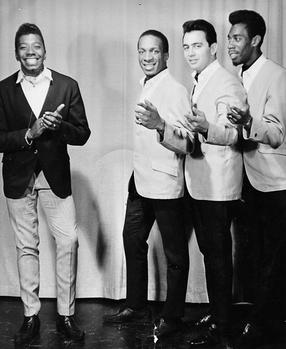Bobby Taylor, Motown Singer Who Discovered Jackson 5, Dead at 83
Vancouvers singer found Jackson 5 after they opened for his band, brought group to Motown

Bobby Taylor (far left) and the Vancouvers circa 1966, when the group was known as "Little Daddy & the Bachelors." Photo: Press Image
Bobby Taylor, the veteran singer and producer who brought the Jackson 5 to Motown in the late Sixties, died Saturday morning at a hospital in Hong Kong, where he’d been living for the last several years. He was 83 and had been undergoing treatment for leukemia and tumors in his spine. “Bobby was a producer, creator and mentor to all of the greats in the early Motown days,” says Suzy Michelson, a longtime family friend and fellow producer who confirmed Taylor’s death to Rolling Stone.
“Bobby had a range that exceeded even Patti LaBelle,” recalls Tommy Chong, who played guitar in Bobby Taylor and the Vancouvers, a Motown band famous for 1968’s Number Five R&B hit “Does Your Mama Know About Me.”
“He used to do ‘Danny Boy’ and make everybody cry in the audience. He would hit notes that were unbelievably high and he could sound like anybody he wanted to sound like””Marvin Gaye, Stevie Wonder, Smokey [Robinson]. I’ve been with a lot of singers, but nothing like Bobby.”
Although Motown and the Jacksons gave credit for years to superstar singer Diana Ross for discovering the family band that made “I Want You Back” and “ABC,” it was Taylor who spotted them at Chicago’s Regal Theatre in 1968. The still-unknown Jackson 5 had been opening for Taylor’s Vancouvers.
“I saw this little kid spinning and stuff and said, ‘Dang, send him upstairs. When he finishes, I want to talk to this kid,'” Taylor said in a 2011 interview.
Taylor, who acted as a sort of Motown scout by the late Sixties, wound up producing the Jackson 5’s earliest recordings for the label, including a version of the Smokey Robinson-penned “Who’s Lovin’ You,” with the Funk Brothers house band in Detroit. Taylor once said he had to pull a gun on the Jacksons’ controlling father, Joe, to prevent interference.
“I’d say [to Michael], ‘You want to check the key out?’ He’d say, ‘No, that’s OK, what key is it in now?’ I’d tell him and he’d say, ‘Yeeeeah!'” Taylor told Rolling Stone recently in an unpublished phone interview from Hong Kong, just before he became ill. “And he’d go in and do it. Everything I gave him to sing, he could sing it right back.”
But Gordy, who felt the Jackson 5’s early Motown songs were “too old-fashioned,” replaced Taylor with The Corporation, a production group of Deke Richards, Fonce Mizell, Freddie Perren and Gordy himself, for the band’s biggest hits. “I’m not an ass-kisser. I’ll tell you what I think. I was running things my way and didn’t want any interference,” Taylor said in an interview for the 1995 Jackson 5 box Soulsation! “I was turning the Jackson 5 into a classic soul act… BG didn’t like that. He had ideas of his own. He wanted Michael doing more bubblegum material. He sent me packing.”
Born in Washington, D.C., to parents of Puerto Rican and Native American heritage, Taylor lived in the same neighborhood as the late singer Marvin Gaye when they were both kids. He told friends his mother sang with Marian Anderson, the great opera singer, and her best friend had been Billie Holiday, so Taylor met Miles Davis, Nat King Cole and other stars when he was growing up. He served as a cook in the military for the Korean War, as he told the South China Morning Post.
He’d been in several bands, including Little Daddie and the Bachelors and one he provocatively called “Four Niggers & A Chink””” its guitarist was Tommy Chong, who would go on to partner with fellow stoner-comic “Cheech” Marin.
Taylor was an outspoken character given to bright-purple suits. He once called Chong from the road and asked him to transfer his pet lion from his apartment to a wild-life shelter. “When Bobby Taylor walked into Motown, the switchboard would alert everybody and they would lock their [office] doors,” Chong says. “There was no filter on Bobby’s mouth. He would tell Berry Gordy: ‘Nappy-headed little n—–, what’s happening?’ He would talk to Berry like he would talk to me.”
Taylor had a habit of “Donald Trumpifying everything,” Chong says, so he exaggerated biographical details like the time Jimi Hendrix played with the Vancouvers but was fired for over-soloing. The truth is Hendrix had heard about the band, showed up for a gig in the U.K. and played bass for a lengthy set while Taylor sang and Chong played guitar.
“[Taylor’s] greatest talent was teaching people how to sing: ‘Come on, motherfucker, you can hit that note. Come on! Just hit it!'” Chong recalls, in a phone interview from Tacoma, Washington, a tour stop with Cheech and Chong. “That’s the way he was.”
Eventually Motown eased Taylor into a solo career, and he scored minor hits such as “I Am Your Man” and “Malinda” before encountering the Jackson 5. After the group moved on from Taylor, he put out “Taylor Made Soul” on Motown in 1969, but it sold little and the company didn’t release the follow-up. He overcame throat cancer in the Seventies, then worked with various musicians, including Ian Levine on “Cloudy Day.”
He moved to Beijing for a job roughly 15 years ago, then relocated to Hong Kong, where he sang at friends’ nightclubs. His last known recording was the unreleased “Humanity,” a tribute to the late rock guitarist Dick Wagner.
As Taylor told the South China Morning Post: “I have 12 kids, met three presidents and, in general, I wouldn’t change a thing.” Adds Chong: “St. Peter’s going, ‘Bobby Taylor’s in heaven now, notify everybody!'”



